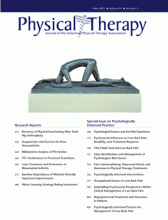Abstract
Background Pain catastrophizing and emotional distress can act as prognostic factors for pain and disability. Research on how these variables interact within individuals and over time is in an early stage. Understanding various patterns of prognostic factors and how these factors change during treatment is important for developing treatments targeting important factors.
Objective The primary aim of this study was to investigate relationships between pain catastrophizing and depressed mood in people seeking primary care for musculoskeletal pain. An additional aim was to relate these patterns of prognostic factors to outcomes during a 6-month period.
Design The design was prospective; data were obtained at baseline and at follow-up.
Methods Forty-two physical therapists taking part in an educational program recruited, from their clinical practices in primary care, consecutive patients who were currently experiencing a pain problem. Patients received various physical therapy interventions between baseline and follow-up.
Results On the basis of patterns of scoring for pain catastrophizing and depressed mood, 4 subgroups of participants were found. Belonging to a subgroup with elevated levels of either pain catastrophizing or depressed mood at baseline was related to the absence of improvement and elevated levels of disability after physical therapy interventions. Furthermore, elevated levels of both variables were related to the highest levels of disability.
Limitations The analyses relied on self-report. Neither treatment content nor pain-related fear was measured. The sample was a mixture of participants reporting acute pain and subacute pain.
Conclusions The results stress the importance of assessing and targeting prognostic factors. Moreover, the results suggest the need to tailor treatments to match patterns of prognostic factors and the need to target depressed mood and pain catastrophizing in physical therapy interventions.
Footnotes
All authors provided concept/idea/research design and writing. Dr Overmeer and Dr Linton provided data collection. Ms Bergbom provided data analysis. Dr Linton provided project management, fund procurement, and institutional liaisons. Dr Boersma, Dr Overmeer, and Dr Linton provided consultation (including review of manuscript before submission).
The Regional Ethical Committee at Uppsala University approved the study.
A poster presentation of this research was given at the EFIC Pain in Europe VI Congress; September 9–12, 2009; Lisbon, Portugal.
This study was supported by grants from the Swedish Council for Working Life and Social Research. The collection of data was supported by the Department of Occupational and Environmental Medicine, Örebro University Hospital.
- Received April 19, 2010.
- Accepted October 29, 2010.












